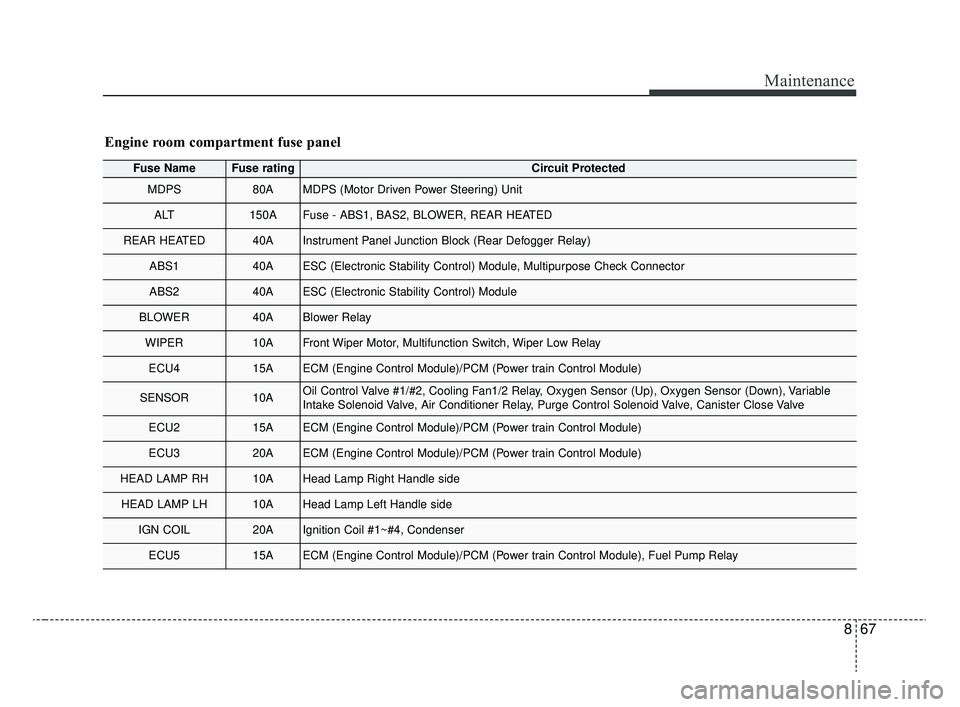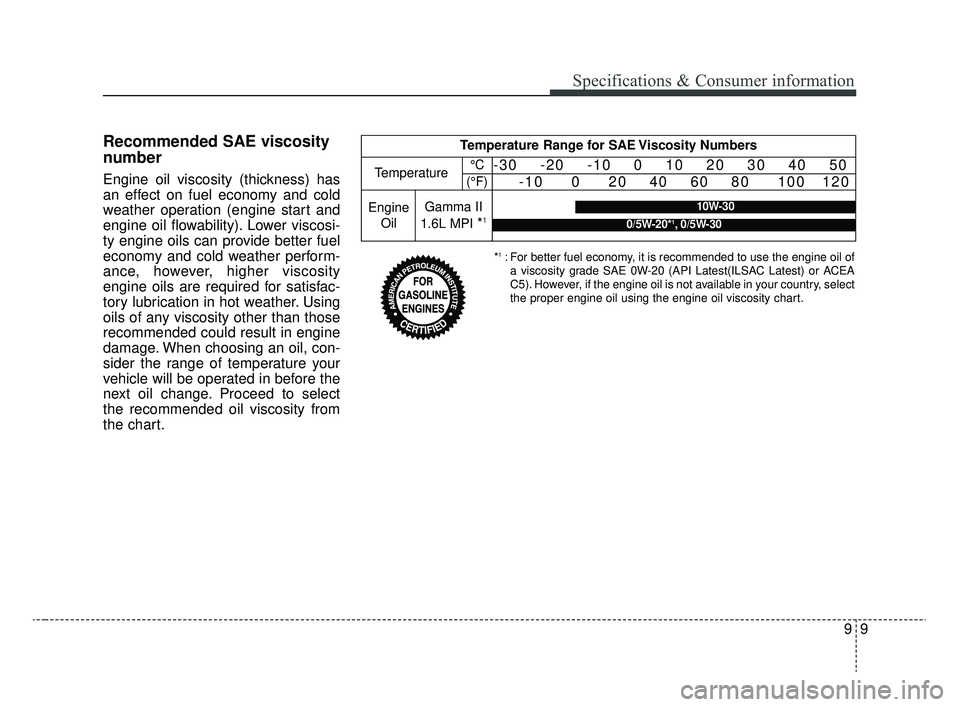Page 450 of 516

867
Maintenance
Engine room compartment fuse panel
Fuse NameFuse ratingCircuit Protected
MDPS80AMDPS (Motor Driven Power Steering) Unit
ALT150AFuse - ABS1, BAS2, BLOWER, REAR HEATED
REAR HEATED40AInstrument Panel Junction Block (Rear Defogger Relay)
ABS140AESC (Electronic Stability Control) Module, Multipurpose Check Connector
ABS240AESC (Electronic Stability Control) Module
BLOWER40ABlower Relay
WIPER10AFront Wiper Motor, Multifunction Switch, Wiper Low Relay
ECU415AECM (Engine Control Module)/PCM (Power train Control Module)
SENSOR10AOil Control Valve #1/#2, Cooling Fan1/2 Relay, Oxygen Sensor (Up), Oxygen Sensor (Down), Variable
Intake Solenoid Valve, Air Conditioner Relay, Purge Control Solenoid Valve, Canister Close Valve
ECU215AECM (Engine Control Module)/PCM (Power train Control Module)
ECU320AECM (Engine Control Module)/PCM (Power train Control Module)
HEAD LAMP RH10AHead Lamp Right Handle side
HEAD LAMP LH10AHead Lamp Left Handle side
IGN COIL20AIgnition Coil #1~#4, Condenser
ECU515AECM (Engine Control Module)/PCM (Power train Control Module), Fuel Pump Relay
SC CAN (ENG) 8.qxp 6/7/2019 9:42 AM Page 67
Page 483 of 516

Maintenance
100
8
High-pressure washing
When using high-pressure wash-
ers, make sure to maintain suffi-
cient distance from the vehicle.
Insufficient clearance or excessive
pressure can lead to component
damage or water penetration.
Do not spray the camera, sensors or its surrounding area directly with
a high pressure washer. Shock
applied from high pressure water
may cause the device to not oper-
ate normally.
Do not bring the nozzle tip close to boots (rubber or plastic covers) or
connectors as they may be dam-
aged if they come into contact with
high pressure water. Waxing
Wax the vehicle when water will no
longer bead on the paint.
Always wash and dry the vehicle
before waxing. Use a good quality
liquid or paste wax, and follow the
manufacturer’s instructions. Wax all
metal trim to protect it and to main-
tain its luster.
Removing oil, tar, and similar materi-
als with a spot remover will usually
strip the wax from the finish. Be sure
to re-wax these areas even if the rest
of the vehicle does not yet need wax-
ing.
Do not apply wax on an embossed
unpainted unit, as it may tarnish the
unit.
OJB037800
CAUTION - Wet engine
Washing the engine compart-
ment with water, includinghigh pressure water, maycause the failure of electricalcircuits located in the enginecompartment.
Never allow water or other liq- uids to come in contact withelectrical/electronic compo-nents inside the vehicle asthis may damage them.
SC CAN (ENG) 8.qxp 6/7/2019 9:44 AM Page 100
Page 501 of 516

97
Specifications & Consumer information
RECOMMENDED LUBRICANTS AND CAPACITIES
To help achieve proper engine and powertrain performance and durability, use only lubricants of the proper quality.
The correct lubricants also help promote engine efficiency that results in improved fuel economy.
These lubricants and fluids are recommended for use in your vehicle.
LubricantVolumeClassification
Engine oil *1 *2 (drain and refill)
Recommends
Gamma II 1.6L MPI3.8 l(4.0 US qt.)API Latest (ILSAC Latest) or ACEA C5
Manual transmission fluidGamma II 1.6L MPI1.5 ~ 1.6 l
(1.4 ~ 1.5 US qt.)
API Service GL-4 SAE 70W - HK SYN MTF 70W
- SPIRAX S6 GHME 70W MTF - GS MTF HD 70W
Intelligent variable transmission
fluidGamma II 1.6L MPI6.5 l (6.87 US qt.)SP-CVT1 *3
Coolant Gamma II 1.6L
MPIM/T5.5 l (5.81 US qt.)Mixture of antifreeze and water
(Ethylene-glycol with phosphate
based coolant for cooling device)
IVT5.5 l (5.81 US qt.)
M/T : Manual transmission
IVT : Intelligent variable transmission
SC CAN (ENG) 9.qxp 12/12/2019 5:07 PM Page 7
Page 502 of 516
Specifications & Consumer information
89
*1 Refer to the recommended SAE viscosity numbers on the next page.
*
2Engine oils labeled Energy Conserving Oil are now available. Along with other additional benefits, they contribute to fuel econ-
omy by reducing the amount of fuel necessary to overcome engine friction. Often, these improvements are difficult to measure
in everyday driving, but in a year’s time, they can offer significant cost and energy savings.
*
3Use only specified genuine Intelligent Variable Transmission(IVT) fluid. The use of non-specified fluid (even marked as compat-
ible with genuine) could result in shift quality deterioration and vibrations, eventually, the transmission failure.(Refer to
“Explanation of Scheduled Maintenance Items” in chapter 8.)
LubricantVolumeClassification
Brake/clutch fluid0.7~0.8 l
(0.7~0.8 US qt.)FMVSS116 DOT-3 or DOT-4
Fuel45 l(11.9 US gal)Unleaded gasoline
SC CAN (ENG) 9.qxp 12/12/2019 5:07 PM Page 8
Page 503 of 516

99
Specifications & Consumer information
Recommended SAE viscosity
number
Engine oil viscosity (thickness) has
an effect on fuel economy and cold
weather operation (engine start and
engine oil flowability). Lower viscosi-
ty engine oils can provide better fuel
economy and cold weather perform-
ance, however, higher viscosity
engine oils are required for satisfac-
tory lubrication in hot weather. Using
oils of any viscosity other than those
recommended could result in engine
damage. When choosing an oil, con-
sider the range of temperature your
vehicle will be operated in before the
next oil change. Proceed to select
the recommended oil viscosity from
the chart.
*1: For better fuel economy, it is recommended to use the engine oil ofa viscosity grade SAE 0W-20 (API Latest(ILSAC Latest) or ACEA
C5). However, if the engine oil is not available in your country, select
the proper engine oil using the engine oil viscosity chart.
Temperature Range for SAE Viscosity Numbers
Temperature°C
(°F)-30 -20 -10 0 10 20 30 40 50 -10 0 20 40 60 80 100 120
Gamma II
1.6L MPI
*110W-30
0/5W-20*1, 0/5W-30
Engine Oil
SC CAN (ENG) 9.qxp 12/12/2019 5:07 PM Page 9
Page 510 of 516

Index
4I
Engine coolant ..............................................................8-23Changing the coolant ..................................................8-25
Checking the coolant level..........................................8-23\
Engine number ..............................................................9-11
Engine oil ......................................................................8-\
21 Changing the engine oil and filter ..............................8-22
Checking the engine oil level ....................................8-21
Engine start/stop button ..................................................6-8 Engine start/stop button position ..................................6-8
Illuminated engine start/stop button ............................6-8
Explanation of scheduled maintenance items ..............8-16
Exterior overview ............................................................2-2
Forward Collision-Avoidance Assist (FCA) system (Radar type) ................................................................6-42Brake operation ..........................................................6-46
FCA system front radar sensor ..................................6-46
FCA system warning message and system control ....6-44
Limitation of the system ............................................6-49
System malfunction ....................................................6-48
Fuel filler door ..............................................................4-42 Closing the fuel filler door..........................................4-\
42
Opening the fuel filler door ........................................4-42 Fuel requirements ............................................................1-3
Do not use methanol ....................................................1-5
Fuel Additives ..............................................................1-5
Gasoline containing alcohol and methanol ..................1-3
Fuses ........................................................................\
......8-55 Engine compartment fuse replacement ......................8-59
Fuse/relay panel description ......................................8-61
Inner panel fuse replacement ......................................8-57
Memory fuse ..............................................................8-58
Hood ........................................................................\
......4-39 Closing the hood ........................................................4-40
Hood open warning ....................................................4-40
Opening the hood ........................................................4-39
How to use this manual ..................................................1-2
If the engine overheats ....................................................7-7
If the engine will not start ..............................................7-4 If engine turns over normally but does not start ..........7-4
If the engine doesn't turn over or turns over slowly ....7-4
If you have a flat tire (with spare tire) ..........................7-27 Changing tires ............................................................7-29
Jack and tools ..............................................................7-27
F
H
I
SC CAN (ENG) Index.qxp 12/12/2019 5:06 PM Page 4